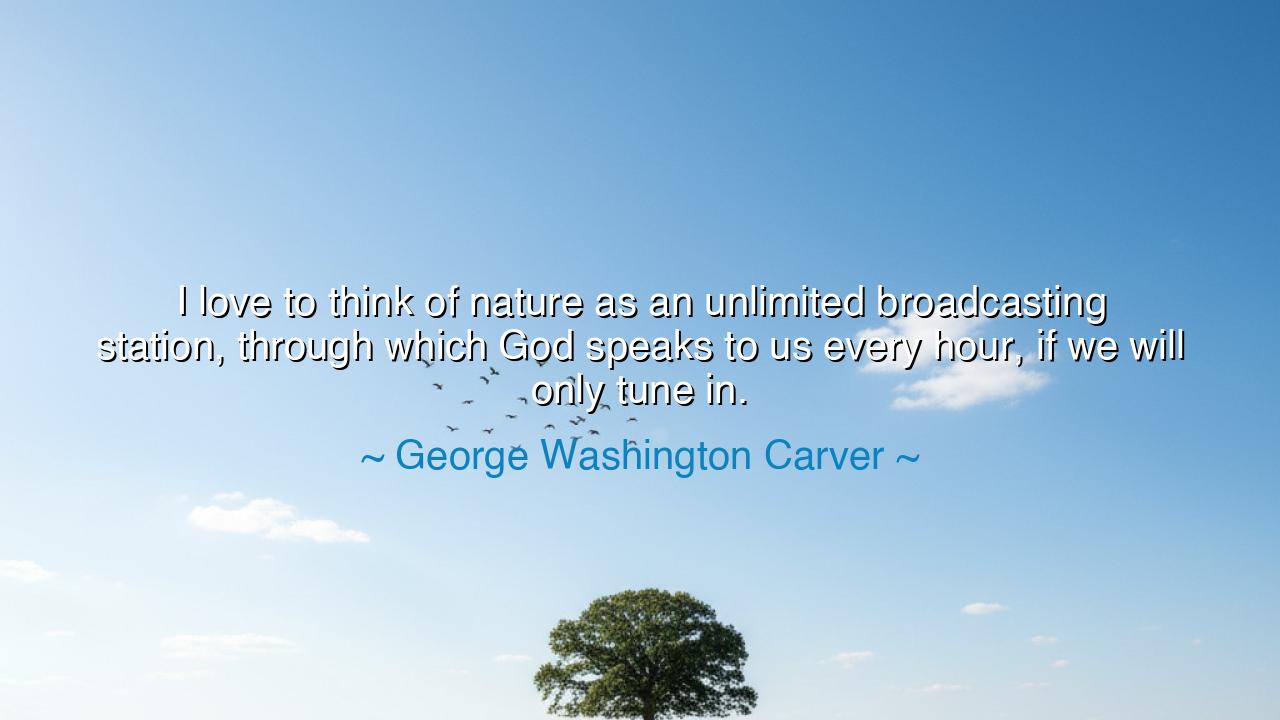
I love to think of nature as an unlimited broadcasting station
I love to think of nature as an unlimited broadcasting station, through which God speaks to us every hour, if we will only tune in.






The words of George Washington Carver, the visionary scientist and spiritual seeker, echo with both reverence and wonder: “I love to think of nature as an unlimited broadcasting station, through which God speaks to us every hour, if we will only tune in.” In this profound declaration, Carver reveals his belief that the divine communicates ceaselessly through the natural world. Every rustle of leaves, the bloom of a flower, the rise of the sun, and the whisper of the wind are part of this eternal transmission. To perceive God in nature, he teaches, is not to invent or seek outside ourselves, but to attune our hearts and minds to the messages already present in the world around us.
The origin of this quote lies in Carver’s life and work. Born into slavery in the mid-19th century and rising to become one of America’s most brilliant scientists, Carver maintained a deep spiritual connection to the world. In his agricultural innovations, he observed the patterns of soil, plants, and seasons, discovering solutions that benefited both humanity and the land. For Carver, science and faith were inseparable: nature was the sacred medium through which divine wisdom revealed itself. By likening it to a “broadcasting station,” he reminds us that God’s guidance is constant, yet requires perception, attentiveness, and openness to receive.
At the heart of Carver’s insight is the principle of receptivity. Just as one must tune a radio to catch a signal, the human spirit must be disciplined, attentive, and contemplative to perceive the divine messages embedded in nature. This perspective transforms ordinary observation into spiritual practice: a walk in the forest, tending a garden, or watching the seasons change becomes a sacred dialogue. God does not speak only in scripture or prayer, Carver insists; God speaks in every leaf, every drop of rain, and every hum of life, waiting for the observer to listen.
History provides luminous examples of this philosophy in action. Consider Leonardo da Vinci, who studied the flight of birds, the flow of water, and the anatomy of the human body with awe and meticulous attention. Through observing nature, Leonardo glimpsed principles that guided art, engineering, and philosophy. Similarly, Carver’s communion with nature allowed him to discover agricultural innovations, such as crop rotation techniques and hundreds of uses for peanuts and sweet potatoes. In both cases, attentiveness to the natural world became a channel to divine insight.
Emotion courses through Carver’s words because they speak to the longing for connection with something greater than oneself. In a world of distraction, human beings often fail to perceive the subtle, eternal messages that surround them. Carver’s metaphor of a broadcasting station captures both urgency and accessibility: the messages are constant, yet require deliberate tuning. To live heedlessly is to miss the guidance that flows ceaselessly through the earth, the sky, and the rhythms of life.
The lesson here is both practical and spiritual. Cultivate the habit of mindfulness and observation. Spend time in nature, reflect on its patterns, and seek lessons from its cycles. Recognize that every challenge, every discovery, and every moment of beauty carries instruction, insight, or inspiration if one is willing to “tune in.” By doing so, one aligns intellect, spirit, and environment, creating a life guided not only by human reasoning but by divine wisdom manifested through the natural world.
Practically, this philosophy calls for curiosity, patience, and reverence. Plant a garden and watch the growth of seedlings. Observe how rivers carve their paths and how trees adapt to seasons. Learn from these patterns and integrate their lessons into daily life. Carver himself transformed his attentiveness into tangible benefits for society, demonstrating that spiritual communion with nature is inseparable from practical action. The divine, he teaches, is not abstract; it is a living, guiding force in every observable phenomenon.
Thus, the words of George Washington Carver endure as a beacon for both the mind and the soul: “I love to think of nature as an unlimited broadcasting station, through which God speaks to us every hour, if we will only tune in.” Let them remind us to observe with care, to listen with humility, and to act with understanding. In attuning ourselves to the constant messages of nature, we cultivate wisdom, inspiration, and alignment with the divine, discovering that God’s guidance is never absent—it is always present, always speaking, waiting only for our attention to hear.






AAdministratorAdministrator
Welcome, honored guests. Please leave a comment, we will respond soon